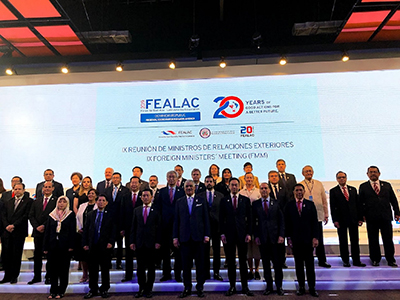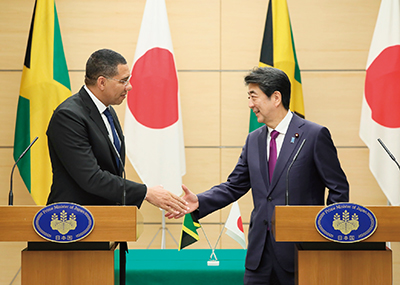Diplomatic Bluebook 2020
Chapter 2
Japan's Foreign Policy that Takes a Panoramic Perspective of the World Map
2 Regional Organizations
In addition to the Forum for East Asia-Latin America Cooperation (FEALAC) and the Community of Latin American and Caribbean States (CELAC), the following regional organizations in the LAC region conduct policy coordination on various issues. In November, the 9th FEALAC Foreign Ministers' Meeting was held in the Dominican Republic, and State Minister for Foreign Affairs Suzuki Keisuke attended from Japan.
 9th FEALAC Foreign Ministers' Meeting (November 9, Santo Domingo, Dominican Republic)
9th FEALAC Foreign Ministers' Meeting (November 9, Santo Domingo, Dominican Republic)(1) Pacific Alliance
The Pacific Alliance (Chile, Colombia, Mexico, and Peru; hereafter referred to as “PA”) aims to conclude a comprehensive free trade agreement with Australia, Canada, New Zealand, and Singapore, and is currently conducting negotiations toward an early conclusion of the agreement. In addition to these four countries, the ROK and Ecuador are expressing interest in participating in the negotiations.
Japan places importance on cooperation with the PA, with which Japan shares fundamental values. On the margins of the 14th Pacific Alliance Summit held in July, Japan and the PA held a ceremony to exchange the Joint Declaration on a partnership between Japan and the States Parties to the Framework Agreement of the Pacific Alliance and the Action Plan of the Joint Declaration.
(2) Common Market of the South (MERCOSUR)
MERCOSUR is a customs union composed of Argentina, Brazil, Paraguay, Uruguay, and Venezuela.1 With a few exceptions, tariffs have been eliminated for all goods traded within the region since January 1995. In addition, Bolivia is an Associated State.2
Japan has held the “Dialogue to Strengthen the Economic Relationship between Japan and MERCOSUR” a total of four times since 2012, and conducts exchanges of views on trade policies and investment.
- 1 Venezuela's participation qualifications have been suspended as of December 2019
- 2 Bolivia signed the participation protocol in December 2012, and is awaiting approval by the National Congress of Brazil
(3) Caribbean Community (CARICOM)
CARICOM was founded by 14 Caribbean nations for its economic integration and foreign policy coordination. It has a large presence in the international arena for their coordinated actions. Although CARICOM countries include many countries with relatively high incomes, they are threatened by natural disasters such as catastrophic hurricanes almost every year, and also have vulnerabilities particular to small island states due to the small size of their populations and economies.
Japan is leading its diplomacy in accordance with the three pillars for Japan-CARICOM cooperation ((1) Cooperation toward sustainable development, including overcoming the vulnerabilities particular to small island states; (2) Deepening and expanding fraternal bonds of cooperation and friendship; and (3) Cooperation in addressing challenges of the international community) announced by Prime Minister Abe in 2014. Japan is also providing support to high income level countries based on their development needs and economic capabilities. Taking opportunities such as the visits to Japan by Foreign Minister Baron of the Commonwealth of Dominica in March, by Foreign Minister Edmond of Haiti in October, and by Prime Minister Holness of Jamaica in December, Japan confirmed the importance of strengthening and deepening bilateral relations with the Caribbean countries as well as Japan-CARICOM relations.
 Joint press conference following the Japan-Jamaica Summit Meeting (December 12, Tokyo; Photo: Cabinet Public Relations Office)
Joint press conference following the Japan-Jamaica Summit Meeting (December 12, Tokyo; Photo: Cabinet Public Relations Office)